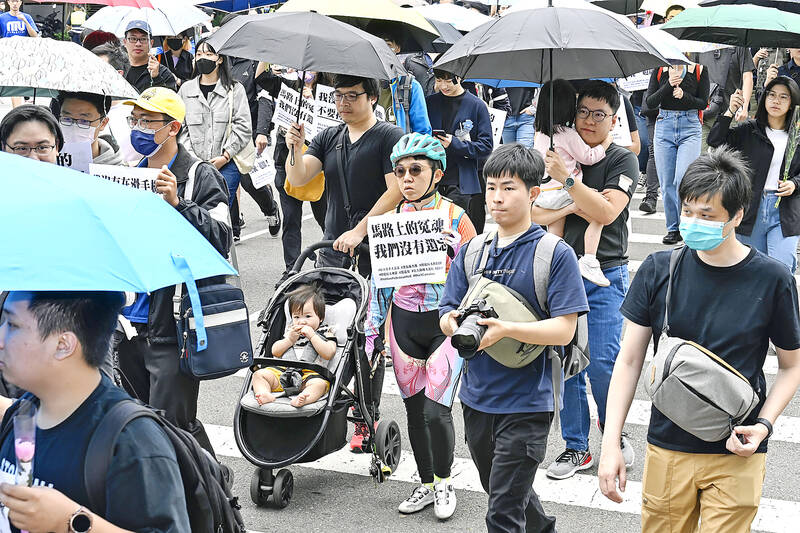Advocacy groups staged flash mobs in several cities yesterday, calling on the government to ensure “pedestrians’ right of way” and to end the “living hell” pedestrians face in Taiwan.
Hundreds of participants, mostly dressed in black, holding open umbrellas, carnations and paper signs, marched for 10 minutes around intersections where fatal traffic accidents involving pedestrians have occurred.
The flash mobs took place in Taipei, New Taipei City, Taoyuan, Hsinchu City, Taichung, Tainan and Kaohsiung.

Photo: Chen Chih-chu, Taipei Times
One of the intersections was in Tainan, where a three-year-old girl was killed and her mother was injured on Monday last week when a car hit them while they were crossing the street on a crosswalk.
One of the organizers, an influencer nicknamed Cheap, said that the government has always prioritized the right of way for motorists, neglecting pedestrian safety.
The flash mobs were organized to encourage the government to focus on pedestrians’ right of way, and get it to lay more sidewalks, as well as ones that are flatter, Cheap said.
A large rally would also be held in late August, in the hopes of ensuring a safer environment for the next generation of pedestrians, he said.
In Taipei, a woman with her one-year-old son in a stroller said she attended the event to mourn for the three-year-old girl who died in Tainan last week, and to express her frustration at using a baby stroller in the city.
It is difficult to push strollers on many sidewalks, and because of illegally parked vehicles she is sometimes forced to dangerously walk between cars and motorcycles on the road, she said.
She said she wants the government to ensure that sidewalks are barrier-free and clamp down on illegal parking.
Also in Taipei, a university student surnamed Chien (簡) said that people in wheelchairs find sidewalks in Taiwan problematic, so while he hopes more people become alert to the difficulties pedestrians face, they must also be aware of the different demands people have.
The flash mobs wore black to mourn the pedestrians who have been killed on crosswalks, while holding umbrellas to symbolize a shield for pedestrians and carnations in remembrance of all the mothers and children who have died and for the family members of traffic accident victims, organizers said.
Deputy Minister of Transportation and Communications Chen Yen-po (陳彥伯) yesterday said that the Institute of Transportation has been discussing a traffic safety bill since late last month, which is to be sent to the ministry for further discussion.
The ministry has over the past few months been focusing on pedestrian traffic safety, especially at intersections, and has drafted plans to work with local governments to improve safety for pedestrians and motorists, such as at intersections and near schools, he said.

CHAOS: Iranians took to the streets playing celebratory music after reports of Khamenei’s death on Saturday, while mourners also gathered in Tehran yesterday Iranian Supreme Leader Ayatollah Ali Khamenei was killed in a major attack on Iran launched by Israel and the US, throwing the future of the Islamic republic into doubt and raising the risk of regional instability. Iranian state television and the state-run IRNA news agency announced the 86-year-old’s death early yesterday. US President Donald Trump said it gave Iranians their “greatest chance” to “take back” their country. The announcements came after a joint US and Israeli aerial bombardment that targeted Iranian military and governmental sites. Trump said the “heavy and pinpoint bombing” would continue through the week or as long

TRUST: The KMT said it respected the US’ timing and considerations, and hoped it would continue to honor its commitments to helping Taiwan bolster its defenses and deterrence US President Donald Trump is delaying a multibillion-dollar arms sale to Taiwan to ensure his visit to Beijing is successful, a New York Times report said. The weapons sales package has stalled in the US Department of State, the report said, citing US officials it did not identify. The White House has told agencies not to push forward ahead of Trump’s meeting with Chinese President Xi Jinping (習近平), it said. The two last month held a phone call to discuss trade and geopolitical flashpoints ahead of the summit. Xi raised the Taiwan issue and urged the US to handle arms sales to

State-run CPC Corp, Taiwan (CPC, 台灣中油) yesterday said that it had confirmed on Saturday night with its liquefied natural gas (LNG) and crude oil suppliers that shipments are proceeding as scheduled and that domestic supplies remain unaffected. The CPC yesterday announced the gasoline and diesel prices will rise by NT$0.2 and NT$0.4 per liter, respectively, starting Monday, citing Middle East tensions and blizzards in the eastern United States. CPC also iterated it has been reducing the proportion of crude oil imports from the Middle East and diversifying its supply sources in the past few years in response to geopolitical risks, expanding

Pro-democracy media tycoon Jimmy Lai’s (黎智英) fraud conviction and prison sentence were yesterday overturned by a Hong Kong court, in a surprise legal decision that comes soon after Lai was jailed for 20 years on a separate national security charge. Judges Jeremy Poon (潘兆初), Anthea Pang (彭寶琴) and Derek Pang (彭偉昌) said in the judgement that they allowed the appeal from Lai, and another defendant in the case, to proceed, as a lower court judge had “erred.” “The Court of Appeal gave them leave to appeal against their conviction, allowed their appeals, quashed the convictions and set aside the sentences,” the judges